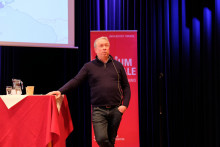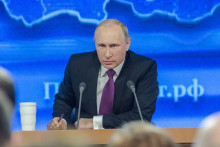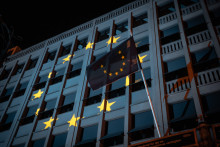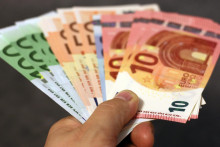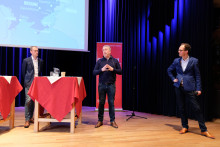Over a month ago, Donnelly last shed his light on the situation in Ukraine. Although a brutal war is being fought, both camps have made little progress in recent times. Russia uses an old-fashioned 'playbook' in its warfare, argues the UT researcher. He compares Russian soldiers to the men during World War I, who were used as cannon fodder by the major powers. 'They were slaughtered by machine-gun fire. That is happening again to Russian soldiers now.'
For Donnelly, it is not only the human sacrifice of Russian troops that is comparable to World War I, the flattening of Ukrainian towns also evokes associations with 1914-1918. 'Soledar is the Ypres of the twenty-first century. Putin does not care much about any of this, as long as he does not lose the war. He will not stop and the Russian leader still has enough resources to continue the war for now.'
Time
In the coming period, it will be critical whether Russia manages to capture Bakhmut, located in the Donbas. 'That would be an important symbolic victory for Putin. It will also be interesting what the Russians intend to do with the salt mines in Soledar. They may use the mines to place explosives behind the Ukrainian front line. We know that kind of tactics from World War I and the American Civil War as well.' Meanwhile, the question remains whether Russia is working on a new offensive, possibly in cooperation with Belarus. 'The more desperate Putin becomes, the more he will lean on Belarus. But the Belarusians do not want to be directly involved in this conflict. For now, the Russians are wise to dig in. The factor of time is in Putin's favour.'
The fact that gaining time is favourable to the Russian leader ties in closely with political developments in the West, the UT researcher argues. So far, the US is by far the biggest supplier of arms and other (financial) support to Ukraine. 'The US is doing the heavy lifting, besides the Ukrainians.' However, the unconditional support is starting to show cracks in Washington. In Congress, there are about 20 ‘Make-America-Great-Again’ Republicans who are flirting with Putin. There is a danger that Republicans, who control the House of Representatives, will not agree to the government's budget plans under the influence of this group, with dire consequences. 'This is the biggest story right now: US support for Ukraine is no longer assured,' Donnelly believes.
Europe
If the backing from Washington stops, the Ukrainians will have a major problem. It is very questionable whether European countries can fill a US gap. According to Donnelly, leading European countries like France and especially Germany have been reluctant to date. 'The tactic has been: Ukraine cannot lose, but it cannot win either.' In recent months, however, that attitude seems to have reversed somewhat. Germany, for instance, is now considering supplying tanks to Ukraine. 'Things are moving in the right direction, but they are moving at snail’s pace. In the end, it comes down to political will, sufficient military equipment and money.'
According to Donnelly, Europe has little choice: support for Ukraine remains desperately needed. 'A ceasefire will lead to disaster, because then Putin will simply attack again in 2024. And what will come after Ukraine? The Baltic States or Poland?' For now, Donnelly does not expect a soon end to the war in Ukraine. 'It will be a fight of the long haul. And we have to ask ourselves: why does Russia keep attacking?'
The explanation, according to Donnelly, lies in the way Putin and his entourage view Russia. The Russian leader still thinks in colonial terms. 'He sees Russia and its former colonies, such as Ukraine, as one great empire. France and the UK abandoned this thinking after World War II, which led to large-scale decolonisation. In Russia, thinking will change only when new political leaders emerge, but that is not the case yet. Until then, there is nothing to do but keep pressure on Putin for as long as it takes.'


